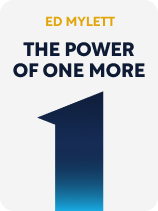

This article is an excerpt from the Shortform book guide to "The Power of One More" by Ed Mylett. Shortform has the world's best summaries and analyses of books you should be reading.
Like this article? Sign up for a free trial here.
What if you could make 24 hours feel like three days? How can you maximize your productivity by changing your perception of time?
Ed Mylett’s time management strategies offer a fresh perspective on making the most of each day. His approach focuses on changing our perception of time to boost productivity and accomplish more than we thought possible.
Read more to discover four powerful techniques that can transform how you experience and utilize time.
Ed Mylett on Time
According to Ed Mylett, time is yours to manipulate—in a sense. He writes that you can change your reality by stretching how you perceive time. While you can’t literally slow time down, you can alter how quickly or slowly time seems to pass and improve how productive you are as a result.
(Shortform note: In Slipstream Time Hacking, Benjamin Hardy suggests you reframe how you think about time in terms of distance. Just like astronauts measure vast distances in light-years, measure your life achievements in terms of distance covered rather than time spent. For example, if you find a way to achieve a multi-year goal, like writing a novel, in a single year, you’ve effectively slowed time down and covered more distance in that period of time—writing a full novel instead of a third or a half. According to Hardy, by reframing how you think about time and applying various time hacks, you can live the equivalent of multiple lifetimes in the years you have.)
Your perception of time depends on various factors such as your age, experiences, and energy levels, but Mylett suggests several ways you can make time feel more abundant.
1. Make a plan. Spend the first 30 minutes of your day assessing your priorities. This helps you focus on doing tasks that matter most for your goals instead of just reacting to whatever comes up during the day.
(Shortform note: How do you determine what your priorities should be? In 168 Hours, Laura Vanderkam suggests you focus on tasks that use your unique strengths—the things you’re amazing at. Block off time on your schedule for these tasks first and delegate tasks you’re not good at. Planning out your day or your week in this way ensures you spend most of your time doing what you do best, allowing you to make quicker progress toward your goals.)
2. Divide your day into “mini days.” We all have only 24 hours in a day, but, by breaking this time into three smaller “days” or timeframes such as noon to 6 p.m., you can essentially squeeze three days’ worth of productivity from 24 hours. These compressed “days” make each minute feel more valuable, which motivates you to accomplish more tasks in less time.
(Shortform note: In When, Daniel Pink explains that our bodies have natural rhythms that divide our day into three phases: a peak, a trough, and a rebound. You typically perform at your best during the peak, feel negative and lethargic during the trough, and recover during the rebound, where you excel at more creative, insightful tasks. The exact timing of this pattern depends on your individual chronotype—whether you’re a morning “lark”, a night “owl” or an in-between “third bird.” When you plan your mini days, consider slotting different types of tasks into the time periods when you’re naturally best suited to tackle them.)
3. Create a sense of urgency. Treat every task as if it’s urgent. Mylett points out that the amount of time you have to complete a task affects how productive you are and how quickly you complete it. If you have a work project due in three months, you’ll likely procrastinate until the deadline looms. To avoid this trap, pretend that the deadline is closer to get more done.
(Shortform note: Some argue that fake deadlines lack the motivational power of real deadlines because we know they’re artificial. Since there are no real consequences for missing them, they’re easy to ignore or push back. Instead of just pretending deadlines are closer than they are, create real accountability—for example, by sharing your deadline with someone who will hold you responsible, or by clearly identifying the real-world consequences of missing your target date. This way, you can create a sense of genuine urgency that pressures you to be more productive.)
4. Reflect. Track your progress toward your goals weekly, daily, or even hourly. The more often you evaluate how you’re doing, the better you can course-correct and use your time more efficiently.
(Shortform note: Tracking your progress on your goals doesn’t have to be boring or tedious. Apps like Habitica turn your goals and tasks into a role-playing game, rewarding you with experience points and virtual gold for completing habits, daily tasks, and to-dos. If you’d prefer to track your progress physically instead of digitally, The Hero’s Journal is a planner that uses a fantasy story framework to guide you on a quest of personal growth and goal achievement. It contains colorable illustrations, motivational quotes, and prompts for reflection, gratitude, and identifying allies and obstacles.)

———End of Preview———
Like what you just read? Read the rest of the world's best book summary and analysis of Ed Mylett's "The Power of One More" at Shortform.
Here's what you'll find in our full The Power of One More summary:
- The power of an extra-mile mindset and how to adopt one
- Tips for building an inner circle of people who support your goals
- How to develop a tolerance for doing hard things






